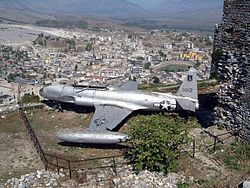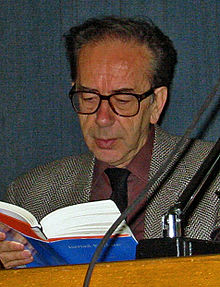This is an old revision of this page, as edited by Alexikoua (talk | contribs) at 20:56, 19 February 2010 (moved to Cepo, Zagorie as per Victor Eftimiu move (Korce)). The present address (URL) is a permanent link to this revision, which may differ significantly from the current revision.
Revision as of 20:56, 19 February 2010 by Alexikoua (talk | contribs) (moved to Cepo, Zagorie as per Victor Eftimiu move (Korce))(diff) ← Previous revision | Latest revision (diff) | Newer revision → (diff) Place in Gjirokastër County, Albania| Gjirokastër | |
|---|---|
 Gjirokastër, as seen from the Citadel Gjirokastër, as seen from the Citadel | |
| Country | |
| County | Gjirokastër County |
| District | Gjirokastër District |
| Elevation | 300 m (1,000 ft) |
| Population | |
| • Total | 34,000 |
| Time zone | UTC+1 (Central European Time) |
| • Summer (DST) | UTC+2 (CEST) |
| Postal code | 6001-6003 |
| Area code | 084 |
| Car Plates | GJ |
| Website | www.gjirokastra.org |
Gjirokastër or Gjirokastra (Template:Lang-el Argyrokastro, Template:Lang-rup, Template:Lang-tr), is a city in southern Albania with a population of around 34,000. Lying in the historical region of Epirus, it is also the capital of both the Gjirokastër District and the larger Gjirokastër County. Its old town is inscribed on the World Heritage List as "a rare example of a well-preserved Ottoman town, built by farmers of large estate." Gjirokastër is situated in a valley between the Gjerë mountains and the Drino River, at 300 meters above sea level. The city is overlooked by a large castle, the Kalaja e Gjirokastres.
Gjirokastër is home to a small ethnic Greek community of about 4000, as well as communities of Vlachs and Roma. Gjirokastër is considered the center of the Greek community in Albania.
History

The city was probably founded during Byzantine rule, some time in the 12th century AD around a fortress on the hillside. It developed into a major commercial centre known as Argyropolis ("Silver City", Greek: Αργυρόπολις) or Argyrokastron ("Silver Castle", Greek: Αργυρόκαστρον).
The city was part of the Byzantine Despotate of Epirus in the 14th century before passing to the Ottoman Empire in 1417. It was captured in 1811 by the Albanian-born Ali Pasha, who carved out his own semi-autonomous fiefdom in the southwestern Balkans. In the late 19th century, when the city was the capital of the sandjak of Ergiri in the Yanya vilayet, it became a centre of resistance to Turkish rule.
Historically, Gjirokastër has been known to produce some of the leading revolutionary figures in Albanian history. The region is also been known to have sheltered Markos Botsaris, a Souliot guerilla fighter who joined the Greek independence movement against the Ottoman Empire in the early 1800s.
During the First Balkan War of 1912–1913, the city was claimed and occupied by Greece, after the retreat of the Ottomans in the region. However, it was awarded to Albania under the terms of the Treaty of London of 1913 and the Protocol of Florence of 17 December 1913. In March 1914 the autonomous Republic of Northern Epirus was declared in Gjirokastër by the local Greek population and was confirmed by the Great Powers during the Protocol of Corfu. The Republic, however, soon became worthless because of the political issues that ensued from the outbreak of First World War and the Greek military returned in October-November 1914, and again captured Gjirokastër and the southern Albanian city of Korçë. In April 1916 the territory was annexed to Greece. The Paris Peace Conference of 1919 restored the pre-war status quo, essentially upholding the border line decided in the 1913 Protocol of Florence, and the city was again returned to Albanian control.
In April 1939, Gjirokastër was occupied by Italy and was annexed to that country along with much of the rest of Albania. During the Second World War, the Greek Army entered the city in 1940 and stayed for a brief six months period, before capitulating to the Germans and returning the city to Italian command. After Italy's capitulation Germany invaded and took control in September 1943, but the city returned to Albanian control in 1944.
The postwar Communist regime developed the city as an industrial and commercial centre. It was elevated to the status of a "museum town", birthplace of the dictator Enver Hoxha, who had been born there in 1908. His house was converted into a museum which became a focal point of Hoxha's cult of personality.
Gjirokastër suffered severe economic problems following the end of communist rule in 1991. It was particularly badly affected by the 1997 collapse of a massive pyramid scheme which destabilised the entire Albanian economy. The city became the focus of a rebellion against the government of Sali Berisha and violent anti-government protests took place which eventually forced Berisha's resignation. On December 16, 1997, Hoxha's house was blown up by unknown (but presumably anti-communist) attackers.
UNESCO World Heritage Site| UNESCO World Heritage Site | |
|---|---|
 | |
| Criteria | Cultural: iii, iv |
| Reference | 569 |
| Inscription | 2005 (29th Session) |
| Extensions | 2008 |
Economy
Gjirokastër is principally a commercial centre with some industries, notably the production of foodstuffs, leather, and textiles.
Culture and places of interest
The city is remarkable for its great natural beauty, as well as his harmonious intercultural mix of Albanian, Byzantine and Ottoman heritage and tradition, which is obvious from the many historical buildings and sites. Many houses in Gjirokastër have a distinctive local style that has earned the city the nickname "City of Stone", because most of the old houses have roofs covered with stones. Due to Gjirokastër's importance to the Communist regime, its city centre was spared at least some of the thoughtless redevelopment that afflicted other cities in Albania, but its designation as a "museum town" unfortunately did not translate into maintaining the old town. Consequently, many of its historic buildings have become dilapidated, a problem that is only slowly being resolved.

The Citadel (Gjirokastër Castle) dominates the town and overlooks the strategically important route along the river valley. It is open to visitors and contains a military museum featuring captured artillery and memorabilia of the Communist resistance against German occupation, as well as a captured United States Air Force plane to commemorate the Communist regime's struggle against the imperialist powers. The citadel dates back to the 18th century and its construction was ordered by Gjin Bue Shpata, a local tribal leader. Additions were built during the 19th and 20th centuries by Ali Pasha Tepelene and the Government of King Zog. Today it possesses five towers and houses a clock tower, a church, water fountains, horse stables, and many more amenities. The northern part of the castle was eventually turned into a prison by Zog's government and housed political prisoners during the communist regime.
Gjirokastër also features an old bazaar which was originally built in the 17th century, but which had to be rebuilt in the 19th century after it burned down. There are more than 200 homes preserved as "cultural monuments" in Gjirokastër today, and it is also the site of the National Albanian Folk Festival now held every five years (most recently in 2009).
When the town was first proposed for inscription on the World Heritage List in 1988, ICOMOS experts were nonplussed by a number of modern constructions which detracted from the old town's appearance. The historic core of Gjirokastër was finally inscribed in 2005, 15 years after its original nomination.
The novel Chronicle in Stone of the Albanian writer Ismail Kadare tells the history of this city during the Italian and Greek ocupation in WWII.
Education
The first school -a Greek language school- was erected in the city at 1663, sponsored by local merchants, functioned under the supervision of the local bishop. The first Albanian school of Gjirokastër was Drita School opened in 1908. Eqerem Çabej University of Gjirokastra is the highest education school. In 2006, the establishement of a Greek-language university in Gjirokastër was agreed upon after discussions between the Albanian and Greek governments .
Notable People

- Kyriakoulis Argyrokastritis (-1828), revolutionary of the Greek War of Independence.
- Eqrem Çabej, linguist and ethnologist
- Dimitrios Hatzipolyzoy, 19th century merchant
- Enver Hoxha, First Secretary of the Albanian Party of Labor
- Ismail Kadare, novelist
- Xhanfise Keko movie director
- Saim Kokona, cinematographer
- Musine Kokalari, author
- Omer Nishani, anti-fascist theorist and freedom fighter
- Fatos Nano, former Socialist Party Leader, former Prime Minister of Albania
- Baba Rexheb, Bektashi religious leader
- Çerçiz Topulli 20th century Albanian nationalist and freedom fighter
- Bajo Topulli, brother of Çerçiz, Albanian nationalist and freedom fighter
- Alexandros Vasileiou (1760-1818), merchant and philosopher
See also
References
- Human rights in post-communist Albania, Fred Abrahams, Human Rights Watch, p.119 "About 4,000 Greeks live in Gjirokastër out of a population of 30,000.
- About Gjirokastra, gjirokastra.org
- "The Greek minority in Albania in the aftermath of communism, James Pettifer, Defense Academy of the United Kingdom, pp.11-12 "The concentration of ethnic Greeks in and around centres of Hellenism such as Saranda and Gjirokastra..."
- Dimitri Pentzopoulos, The Balkan Exchange of Minorities and Its Impact on Greece, p. 28. C. Hurst & Co, 2002. ISBN 1850656746
- Winnifrith, Tom (2002). Badlands-borderlands: a history of Northern Epirus/Southern Albania. London: Duckworth. p. 130. ISBN 0715632019.
- Contested Spaces and Negotiated Identities in Dhermi/Drimades of Himare/Himara area, Southern Albania. Nataša Gregorič Bon. Nova Gorica 2008. Pg. 140 Formation of the Albanian Nation-State and the Protocol of Corfu (1914)
- Vassilis Nitsiakos, Constantinos Mantzos, "Negotiating Culture: Political Uses of Polyphonic Folk Songs in Greece and Albania", p. 197 in Greece and the Balkans: Identities, Perceptions and Cultural Encounters, ed. Demetres Tziovas. Ashgate Publishing, Ltd, 2003. ISBN 0754609987
- Epirus, 4000 years of Greek history and civilization. M. V. Sakellariou. Ekdotike Athenon, 1997. ISBN 9789602133712, p. 308
- Albania's Captives. Pyrrhus J. Ruches. Argonaut, 1965. p. 33 "At a time of almost universal ignorance in Greece, in 1633, it opened the doors of its first Greek school. Sponsored by Argyrocastran merchants in Venice, it was under the supervision of Metropolitan Callistus of Dryinoupolis."
- Country Report on Human Rights Practices in Albania, 2006. U.S. Department of State.
- Albania's captives. P. J. Ruches. Argonaut, 1965, p.33.
- "Gjirokastër." Encyclopædia Britannica,2006
- "Gjirokastër or Gjinokastër." The Columbia Encyclopedia (2004)
External links
- Website of Gjirokastra
- Photo Gallery of Gjirokastër from Hotel Kalemi
- Photos of Gjirokastër
- Photo gallery by Andy Carvin
- Gjirokastra Online by Klodian Lula & SIFE UGJ
| World Heritage Sites in Albania | ||
|---|---|---|
| with Austria, Belgium, Bosnia and Herzegovina, Croatia, Czech Republic, France, Germany, Italy, North Macedonia, Poland, Romania, Slovakia, Slovenia, Spain, Switzerland and Ukraine This is the extension of the site that has been inscribed in North Macedonia since 1979. The area around the town of Pogradec at the shores of Lake Ohrid was inhabited by the Illyrians in the 5th century BC, followed by the Romans and the Slavs. Traces of the Roman road Via Egnatia are evidence of an important passage route in the region. The ruins of the paleo-christian church of Lin together with its floor mosaics reveal the presence of Christianity. The historical centre of Pogradec represents an example of 19th to 20th century Albanian vernacular architecture. | ||
| Subdivisions of Gjirokastër County | ||
|---|---|---|
| County seat: Gjirokastër | ||
| Municipality of Dropull |  | |
| Municipality of Gjirokastër | ||
| Municipality of Këlcyrë | ||
| Municipality of Libohovë | ||
| Municipality of Memaliaj | ||
| Municipality of Përmet | ||
| Municipality of Tepelenë | ||
| Cities and towns in Albania share the status of a geographic unit which makes up a municipality. | |
| (74) |
|
